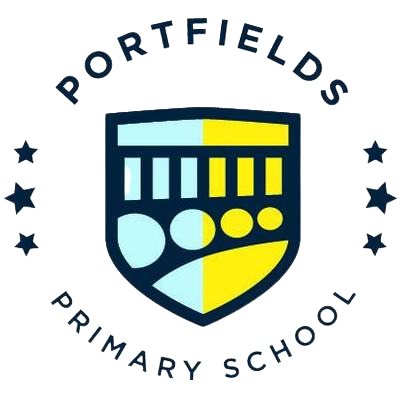Reading
At Portfields Primary School, we prioritise the ‘simple view of reading’. We believe children should be able to read words/text and understand what they have read. We are determined that every child will learn to read fluently and develop a life-long love for reading by the end of their Portfields’ journey. We believe that reading is a key life skill and the ability to read is fundamental to succeed in education and empower future learning.
A Portfields’ child will:
- have a desire to read widely for both pleasure and information;
- read with confidence, fluency and understanding;
- develop a wider vocabulary and knowledge of the world to broaden their horizons
We use a range of strategies, in addition to phonics, such as a variety of decoding methods, teaching high frequency words through sight recognition, discussion through picture books and high quality interventions.
Our school works with external partnerships and through the many connections such as inspirational writers/authors. It allows us to improve and enhance our resources and inspire our pupils to love reading.
Through the Portfields’ Big Reads, children are deliberately exposed to a whole school reading spine that combines classics and essential reads to build a common bank of stories that binds the Portfields’ reading community together.
Reading volunteers, including Buster - our reading dog - to enhance our reading provision every week hearing our vulnerable readers.
Talk for Reading develops our children into efficient, effective, thoughtful and strategic readers who can learn about life, discover information and deepen their thinking through considering other people’s views and experiences with a critical mind.
In addition, children read one to one with a teacher frequently, which provides valuable time for the teacher to model fluency and expression and discuss any unfamiliar vocabulary. It also highlights any gaps in reading skills and allows the teacher to closely monitor the child’s progress.
At Portfields, we aim to develop a whole community culture of reading, so children are encouraged to read for pleasure at home and school. Teachers read a variety of high-quality texts to the children daily through ‘storytime’.
Portfields Primary School Reading Strategy
Our aim is that every child leaves Portfields Primary School with:
- a desire to read widely for both pleasure and information;
- the ability to read with confidence, fluency and understanding;
- a wider vocabulary and knowledge of the world to broaden their horizons.
1. Daily Reading Lesson
EYFS / Y1 – Daily Read, Write, Inc. phonics lessons
Y2 – Read, Write, Inc. phonics lessons moving to Talk for Reading
KS2 – one to one reading sessions and Talk for Reading Sessions
Y2 – Y6 have Talk for Reading sessions at least 4 times a week
2. Reading Practice
Teachers will listen to all children read frequently
Teachers will have 1:1 reading sessions with identified children
Reading volunteers will listen to children read to practise their fluency
KS2 reading buddies will listen to younger children read and practise their fluency
3. Children Read to Daily
EYFS / KS1 / KS2 – ‘ Storytime’ daily class read to the class
4. Reading for Pleasure in Class
Mini libraries in each class of quality books to engage emotions; be diverse; show different perspectives
Library time in the Space Library (EYFS and KS1) and Jungle Library (KS2)
5. Reading Records
Completed at home (and in school for EYFS) to share the love of a new story
6. Independent Reading Time
Class sets of high-quality reading books, reading books chosen by children, comics and subscriptions
7. Promote a Community Culture of Reading
Teachers model a love of reading and are excited about books
A wide range of authors and genres are discussed
Opportunities to share books, opinions and authors
Family and community reading days
Activities such as World Book Day, author visits (in school and online) promote our reading culture
Reading Ambassadors from Year 6 support the culture as role models to share, read and listen to younger readers
8. Reading At Home
Reading books are sent home and changed as appropriate
Parent support sessions to give tips on reading at home
Additional support will be given to children/families who require it
9. Reading Every Lesson
Teaching sequences linked to quality texts and novels
Reading and integration of texts incorporated where possible into all lessons
Quality modelling and engaging with texts as a Historian, a Geographer, a Scientists etc
Catch Up and Interventions
Some children may require additional support in Reading for identified children
This is achieved by:
- Additional phonics
- Fresh Start (RWI intervention)
- 1:1 reading
- Small group work
- Small group book sharing to develop retrieval, inference and comprehension
- High quality FREE books for all PP children and SEND
- Diversity and equality in all books
- Opportunities for children to listen to, act out and discuss stories
- Opportunities for children to tell stories
- Stories read by teachers, adults, authors, visitors (including audio books and Author Zooms)
